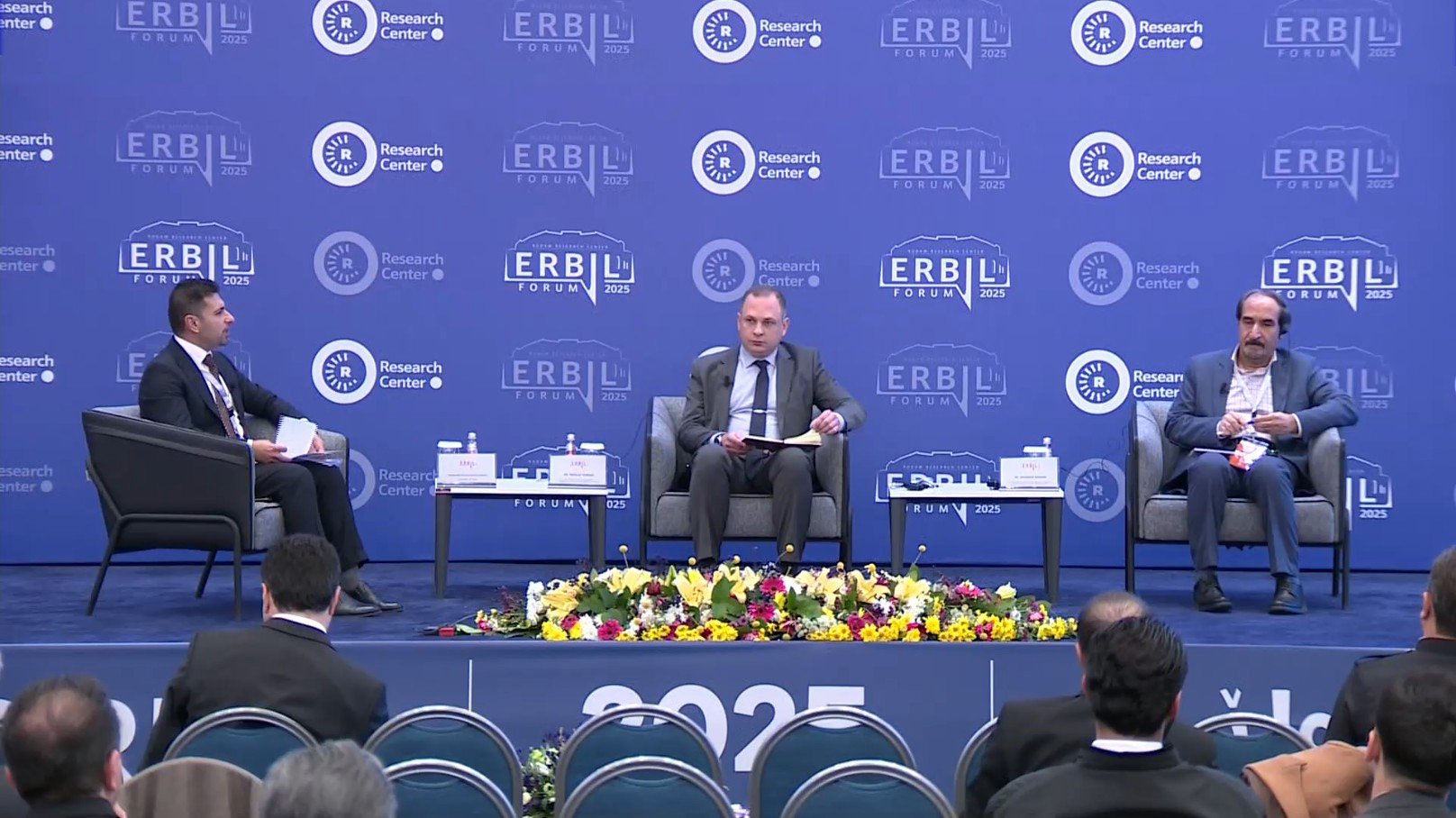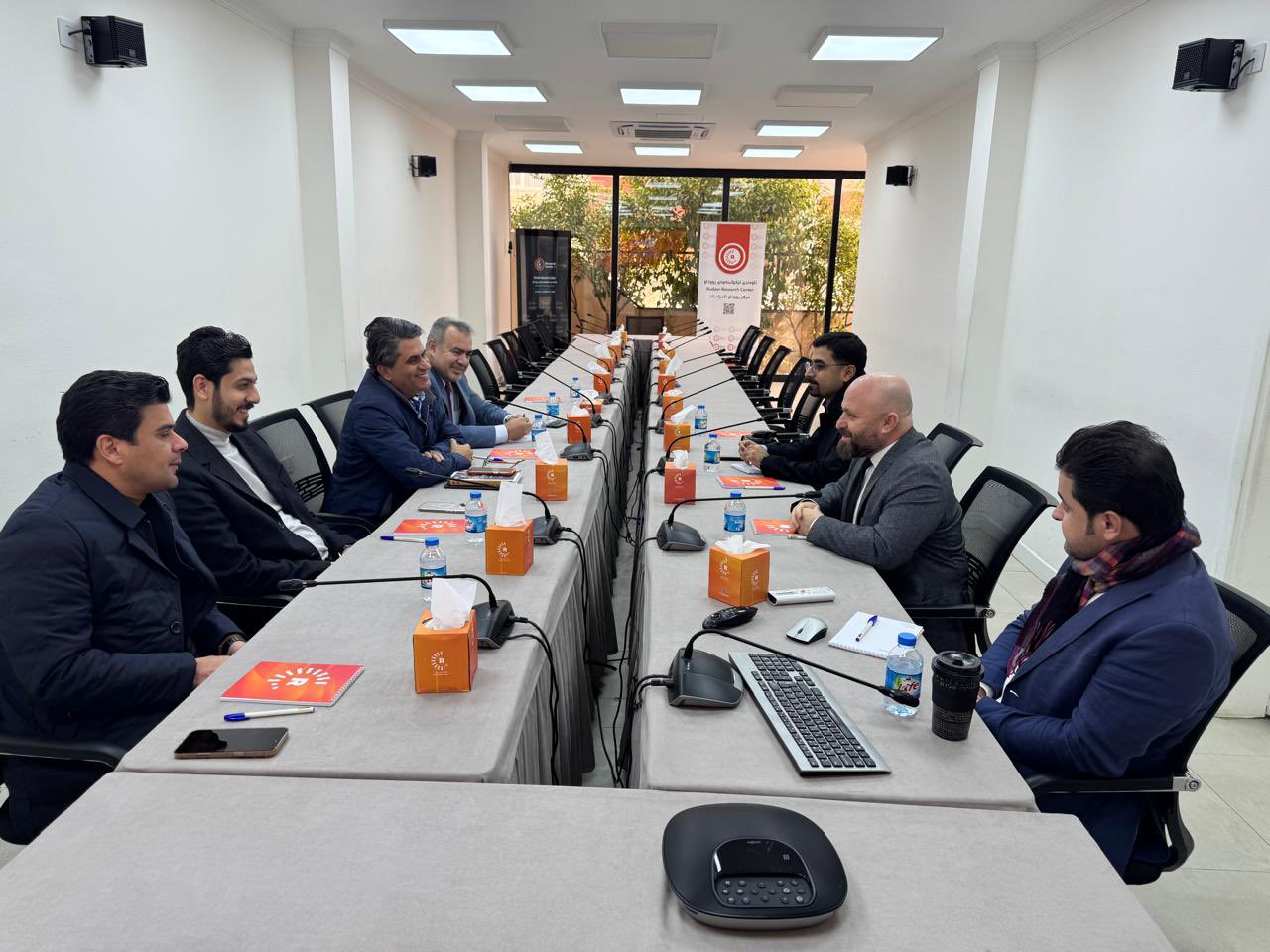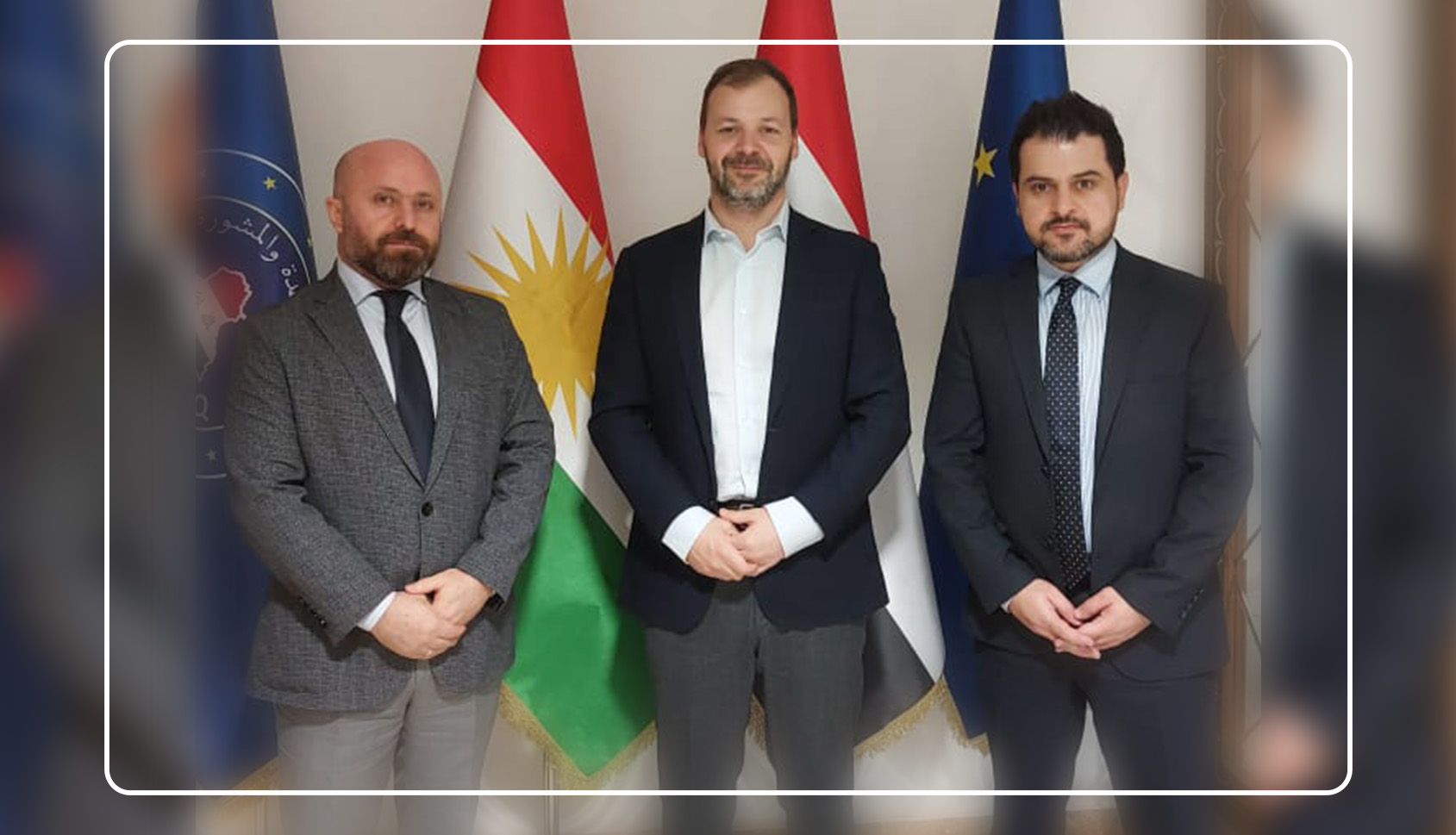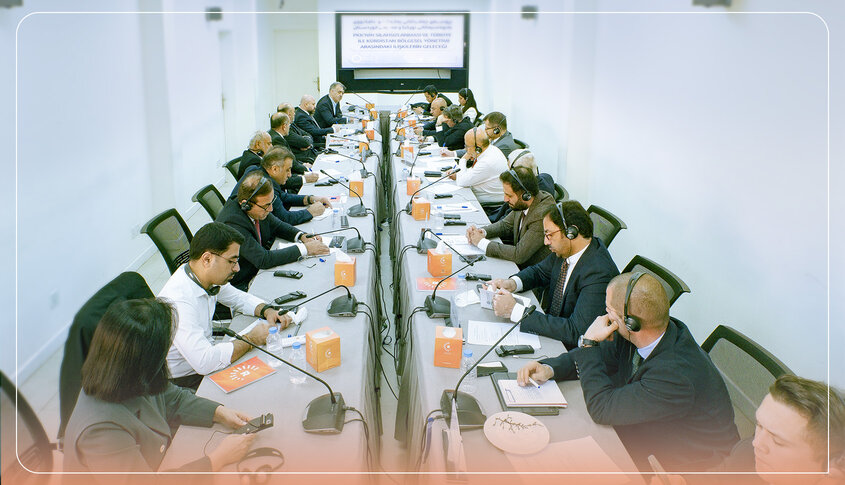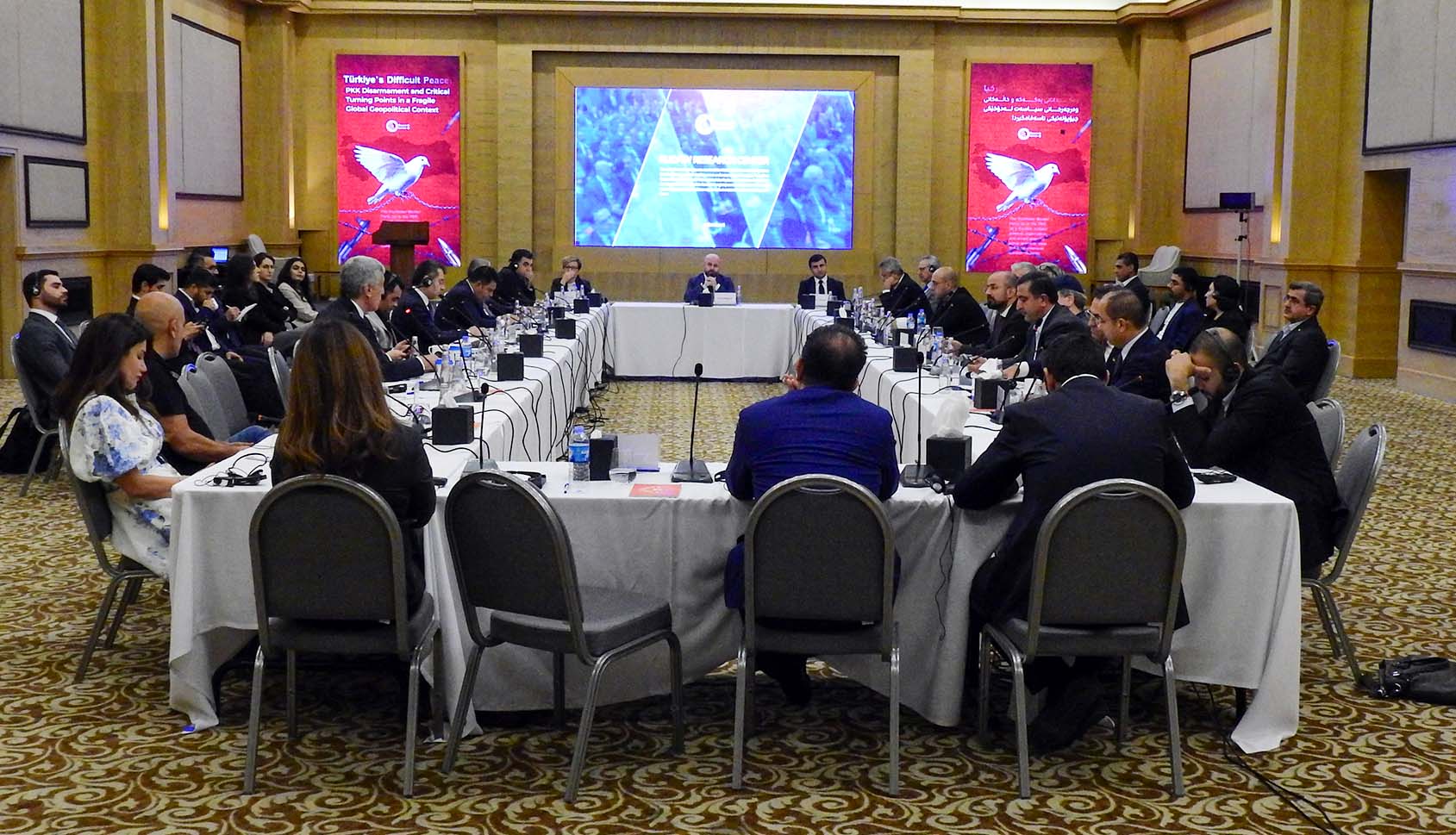Dr. Dalsoz:
Good afternoon, ladies and gentlemen. Today's panel is focused on Russia and the Middle East—examining new regional realities. I am Dr. Dalsoz Jalal, as mentioned in the introduction, and I will be moderating this panel.
Over the last two days, there has been extensive discussion about the Middle East, and many have described it as an incredibly complex region with many ongoing issues. One of the researchers mentioned that some countries in the region are on the verge of collapse, but I won’t delve into that right now. What I will say is that the situation in the Middle East is rapidly escalating.
For centuries, the Middle East has been a battleground for competition between Russia and other superpowers. In this context, Russia has many interests in the region. These interests continue to shape and drive Russia’s policy, even in the aftermath of the October 7, 2023, war between Israel and Hamas.
Russia's interests remain strong, even as its ally, the regime of Bashar al-Assad, faces challenges. These interests continue to influence Russia’s involvement in the rebuilding of the Syrian regime. Despite the ongoing conflict between Russia and Ukraine and the imposition of sanctions on Russia, Russia has made significant efforts to open diplomatic and trade doors with Middle Eastern countries and build strong partnerships with nations like Iran, Saudi Arabia, and other Gulf states.
Russia has also encouraged these countries to join organizations where it plays a leading role, such as BRICS and the Shanghai Cooperation Organization. This will be one of the topics of our discussion today with my distinguished guests. I will ask them how Russia plays a role in this multipolar world.
Today, we are joined by Dr. Nikolay Surkov, Senior Research Fellow at the Institute of World Economy and International Affairs at the Russian Academy of Sciences; Ambassador Aleksandr Aksyonov, Vice President of the Russian International Affairs Council; and Dr. Jahangir Karami, Associate Professor in the Department of International Relations at the University of Tehran. Welcome, everyone.
Unfortunately, we do not have a translation available for Russian today, so we will be conducting this discussion in English. Dr. Surkov, let’s start with you. According to the final report issued by the Munich Security Conference in February 2025, the world is moving toward multipolarity—away from unipolarity and bipolarity. My question is, within the context of Middle Eastern issues, where does Russia position itself in this shift toward multipolarity, and how does Russia play a role in this process?
Dr. Nikolay Surkov:
Thank you for this question, and I would like to thank Rudaw for inviting me, bringing me here, and giving me the opportunity to convey the Russian perspective. However, I must make a disclaimer: I am not representing the Russian government in any official capacity. I am speaking as a private researcher.
I have been carefully listening to the previous discussions, and several times I heard people saying that Russia is withdrawing from the Middle East, which is not true. Of course, Russia is very focused on events and processes in its immediate neighborhood, but this is a tactical issue. From a strategic perspective, Russia will continue to play a visible role in this region, and I will explain why.
Since Russian relations with the West have deteriorated dramatically, Russia is adjusting its foreign policy. Russia is turning eastward, towards the Global South. But more importantly, from Russia's perspective, the world is becoming multipolar. I conducted extensive analysis over the past year, particularly during Russia's presidency of the BRICS, and I had to provide several reports on that. What we see is that Arab countries already live in a multipolar world, and Russia is part of this multipolar world. From this perspective, the Middle East is a priority for Russia because the region is undoubtedly one of the powerhouses—not only of the Global South but of the world as a whole.
As I mentioned, Russia is very focused on the Global South, and the country will continue to try its best to establish new economic and political alignments in this area, developing new strategic partnerships. Russia already has strategic partnerships with Arab states, including Egypt, Algeria, and the United Arab Emirates. Many key players in the Middle East are already working with Russia, although sometimes this cooperation may be broader, and at other times, not as broad. Still, this has been the trend for at least the past 20 years.
From the Russian perspective, we need to think about several global rivalries, such as the one between Russia and the West, or the U.S. and China. However, there are still global challenges that require a global response, and this is where Russia's views align with those of the Arab states. When asked about the BRICS agenda, Arab states consistently highlight that, while global power rivalries will always exist, there are global challenges that can only be addressed on a global scale. These challenges include climate change, food security, pandemics, and strategic stability. These are issues that require collaboration among as many countries as possible.
As for the Middle East, Russia wants to establish broad, multi-dimensional ties with the region. The Middle East is a critical region, one of the powerhouses of the global world, and Russia does not wish to engage in any kind of geopolitical competition here. We understand that Gulf countries, and many others, are concerned that global powers might turn this region into an area of confrontation once again. Russia does not want that. We also want to see this region stable, prosperous, and safe because it is one of the key conditions for the future development of the Global South and for stabilizing the global balance of power.
Ultimately, the main idea behind multipolarity is to address the imbalances that exist in the world order. We must consider reforms to the UN and work toward rebalancing the global financial system. From this perspective, Russia and the Arab states stand on the same side. We frequently hear calls for creating alternative financial mechanisms and reforming the UN to make it more transparent and efficient. The UN's paralysis in Gaza highlighted the urgent need for such reforms.
Another critical issue is extremism and terrorism, which are not only a direct threat to the Middle East but also a concern for Russia. Russia has a large Muslim population, which is vulnerable to extremist propaganda and radical indoctrination. Protecting our citizens from such threats is a priority.
As I mentioned, despite the tactical changes and the fact that Russia must focus on Ukraine and its immediate neighborhood, Russia will remain engaged in the Middle East. In the long run, the Middle East will be one of Russia's key partners, both in terms of the economy and politics, and I believe it will also play a crucial role in solving global problems.
Dr. Dalsoz:
Let me take this point. You mentioned that Russia is going to stay in the Middle East and remain an active player. Recently, Israeli Prime Minister Benjamin Netanyahu, with the assistance of former U.S. President Donald Trump, promised to redraw the maps of the Middle East.
The question is: Will Russia only be an observer of this redrawing, or will it take part in it? History is likely to repeat itself, and Russia could become one of the active players in redrawing this map.
Dr. Nikolay:
Well, I think Russia is not trying to redraw anything in the Middle East. What Russia has always been trying to do is to be a status quo player, believe it or not. Actually, from the Russian perspective, the situation that existed before the Arab Spring was much more stable than what we have now.
Believe it or not, Russia’s return to the Middle East—both politically and militarily—was also motivated by the need to stabilize the region. The way Russia sees it, particularly in the fight against extremism, is that it is essential to support national states. From Moscow's perspective, the key players in this region are still national states. Any destabilization of a regional state tends to provoke other international players and regional powers, which always leads to a major crisis.
So, that’s Russia's attitude, and I believe it will continue to prevail. Yes, we have a different situation now, but this is Russia’s approach: to keep the region as stable as possible. I understand that remaining equidistant in this region is difficult, but that is what Russia is trying to do—maintain a balance in its policies. For example, Russia is trying to develop ties with Iran, but at the same time, Russia has very good relations with some Gulf States. These things are not incompatible, by the way, and that is what we are trying to demonstrate.
We are also trying to show that a foreign power, a global power, can still play a constructive role in this region. For example, when we discuss this issue with our Chinese counterparts, they also say that their goal is stability. However, their motto is "stability through development." Russia, on the other hand, is ready to engage in different spheres, including the military. But this is also Russia's goal.
In my introduction, I mentioned that Russia has built deep trust with some Gulf States, particularly with countries like Iran and Saudi Arabia. Recently, Saudi Arabia is going to host a meeting between Donald Trump and Vladimir Putin. How has Saudi Arabia become a country where Russia has placed its trust? Why has Saudi Arabia gained such a trusted status for Russia?
I can explain this. From the Russian perspective, it is important to find partners in this region who maintain strategic autonomy. Russia really appreciates Saudi Arabia’s willingness to guarantee its own strategic autonomy. We also value the idea of positive neutrality, which the Saudis promote.
So, positive neutrality and strategic autonomy are key issues for us. Especially now, as the world becomes multipolar, we see Saudi Arabia as an independent player that can be trusted. Saudi Arabia is capable of defending its own interests and taking an independent stance. We saw this even after 2022 when they refused to join the sanctions and maintained very active diplomatic efforts. This is very important.
It’s not just Saudi Arabia, though. The UAE is also a very important player. In fact, the UAE helped Russia establish its foothold in the Gulf. We also have Egypt. Let’s not forget about that. Russia still has many partners in this region, and that’s one of the reasons why Russia is here to stay.
Dr. Dlsoz:
Let me ask you one more question, but I would appreciate a brief response. Russia witnessed the collapse of one of its close allies, Bashar al-Assad, and now a new regime is expected to be established in Syria. How do you think the relationship between Russia and the new regime in Syria will evolve? How will Russia approach this new government?
Dr. Nikolay Surkov:
I can tell you that Russia’s stance towards the new authorities in Syria is very pragmatic. First of all, Russian officials have made it clear that Russia has dealt with various political regimes in Syria. Don’t forget that cooperation between the Soviet Union and Syria began long before Hafez al-Assad’s era, dating back to the mid-1950s.
Therefore, Russia is capable of engaging with different regimes and even Islamist groups. For example, we currently have pragmatic relations with the Taliban. It is possible to engage with various factions. Russia has also engaged in dialogue with some groups in Idlib, especially during discussions on de-escalation zones. Some ties have already been established.
Russia is open to cooperating with the Syrian government, but there are specific benchmarks. These benchmarks, which have been reiterated several times, include the establishment of an inclusive government, respect for minorities, and the absence of terrorism. These factors are essential for us.
Dr. Dlsoz:
Yes, we can hear you. I would like to ask you a question, Ambassador Aleksandr Aksenenok. On the 18th anniversary of diplomatic relations between Russia and Iraq in September 2024, Iraqi Foreign Minister Dr. Fuad Hussein expressed his pride in the historical ties between Iraq and Russia. My question to you is: What has Russia done that makes Iraq proud of its relationship with Russia? What are Russia's interests and the underlying motivations behind these interests in its relationship with Iraq?
Ambassador Aleksandr Aksenenok:
Yes, I must admit that your question about Iraq was rather unexpected, but I will try to clarify Russia's position and its interests in Iraq.
If we look at the relationship between Russia and Iraq since 2003, we see that these relations have generally developed positively, despite the turbulence in Iraq—such as the American occupation, the civil war, and economic challenges. Russia has consistently sought cooperation and encouraged a more independent course for the Iraqi government. Russia has also supported Iraq’s efforts to mediate between regional powers, such as Saudi Arabia and Iran, for instance.
We also share common economic interests. Russian companies participate in oil projects in Iraq, so there is a convergence of interests, not just regarding an anti-American stance but also on other geopolitical and economic matters. Russia fully understands the challenges the Iraqi government is facing.
However, to save time towards the end of this conference, I would like to focus more on the broader aspects of Russia's current policy in the Middle East. These can be categorized into three major areas:
The Ukraine-Russia conflict and its impact on the Middle East.
The Gaza-Israel-Palestine situation and the roles of Russia and the United States.
Syria, with its regional and international aspects from Russia’s perspective.
I would like to add to what my colleague, Dr. Surkov, said. It is a well-known fact that the Ukraine war is now a central issue shaping Russia’s approach to global politics, including the Middle East. The situation has become much more complicated and, at times, even intricate for everyone involved.
In terms of the Middle East, Russia does not see substantial political damage to its regional position. I can confirm that Russia has no intention of withdrawing from the region. From Russia’s perspective, the final outcome of the Ukraine conflict is not solely about Ukraine; it is about European, Euro-Atlantic, and Euro-Asian security. Ultimately, resolving the Ukraine conflict will be decisive for the whole world.
Against the backdrop of the war, the West has made attempts to push Russia out of the region. However, I do not believe these attempts will succeed. Even if Russia does not directly participate in mediation efforts related to Gaza, it will undoubtedly have a say and a significant influence on shaping the future status of Gaza. Furthermore, Russia will be involved in shaping the future of Israeli-Palestinian and Israeli-Arab relations, based on regional conflicts that require regional solutions.
From Russia’s perspective, this is a time when regional powers should play a major role, with global powers facilitating them in their aspirations and actions within the region. The shifting policies of the U.S. have led to a sense of frustration among Gulf leaders. I believe the Gulf is now at the center of both regional and possibly global politics. As a result, Gulf leaders are seeking alternative alliances and partnerships with China and Russia. This approach is now being referred to as a "balancing act."
Dr. Dlsoz:
Yes, it is. Let me interrupt you and ask one question. Let’s turn to the relationship between the Kurdistan Region. What we observe, and history proves it as well, is that Russia has primarily focused on strengthening its relationships with state actors. My question is: How has Russia formulated its relationship with non-state actors, using the Kurdistan Region as an example?
Ambassador Aksenyonok:
You know, the Kurdistan Region is encompassed by four countries. Russia’s political stance on the Kurdish question and the future of the Kurds has been based on the recognition of minority rights in accordance with international law. It is well known that Russia has made numerous efforts to convince President Assad to change his stance toward the Kurdish minority. Russia even presented a draft of the Syrian constitution when the parliament consisted of two chambers.
Russia has also engaged in numerous agreements with Turkey, but it has never abandoned this principle. The principle is not secession but rather autonomy within the framework of a unitary state. Federalism is a difficult experience, particularly in the Arab region, as we can see from the case of Yemen, for example.
The Kurdish issue is very central to political reforms in the region. It should be resolved in accordance with the rights of the Kurdish minority. The Kurdish minority may have a special status in Syria or Iraq, particularly in comparison to other minorities. Russia views this model as one where the Kurdish question is addressed through an autonomous status within the framework of a unitary state, not necessarily a federal one.
Dr. Dlsoz:
I have another question for you, but if you could answer it briefly, that would be great. The Russian Federation provides a large number of academic scholarships for Iraqi students each year. For the academic year 2025-2026, Russia has offered 260 scholarships, including 70 seats for students from the Kurdish region. My question is: Many Iraqis are still not very familiar with your language and culture. Don’t you think there is a significant gap in awareness? Why hasn’t Russia established a training center or other initiatives to help the people of Iraq become more familiar with Russian culture and language?
Ambassador Aksenyonok:
To be frank, I am not directly involved with the question regarding scholarships for Kurdish students. However, I would like to contribute to the issue of Syria, as I believe it is of great importance to both our Kurdish and Arab colleagues and remains under-addressed.
Regarding Syria, many judgments have been made about the broader implications for Russia if the Assad regime were to fall. Some of these are mere speculation, while others are exaggerated, and some stem from a lack of understanding of the real dynamics and the evolution of Russia’s relationship with its Syrian ally.
I would like to make several points. First, there is an argument that Russia’s prioritization of its military operations in Ukraine has affected its ability to keep Assad in power. To some extent, this is true, but it is not the main reason. The primary motivation for Russia’s intervention in Syria since 2015 was not merely to ensure Assad remained in power. The key motivation was based on broader global calculations, including seeking a partnership with the United States in the fight against terrorism and cooperation on chemical weapons under the Obama administration. The broader strategic goal was to retain global recognition of Russia as a great power, which was the main motivation for Russia's involvement in Syria.
Dr. Dalsoz:
Dr. Alexander, we are running out of time. Thank you so much for your input. However, please allow me to complete. At the end, if we have time, I will give you a chance to speak, as we may have some questions from the audience. But for now, let me move on to the next speaker. I will come back to you at the end.
Now, let’s discuss the relationship between Iran and Russia. During the Biden administration, the Russian Federation established a very strong relationship with the Islamic Republic of Iran. Moscow and Tehran even formed a long-term partnership and signed a comprehensive treaty on January 17, 2025. The question here is: What will happen to this relationship under the Donald Trump administration? Will it continue? As we know, the relationship between Russia and the United States may become smoother and stronger in the future.
Dr. Jahangir Karami:
I am very grateful to the esteemed officials of the Rudaw Research Center for inviting me and the other Iranian guests to this major conference. I would have liked to speak in Kurdish Kalhuri with dear friends, but I fear that the kind translators might face difficulties in translating from Kalhuri to other languages such as English, Arabic, and Sorani.
I had a few slides; if possible, I would have liked to present them first and then respond. The main topic of my discussion is the change in Russia's foreign policy after the Ukraine war, especially after the fall of the Syrian government.
In the introduction, I referred to several documents and statements that indicate changes in the Middle East. These changes are important, and it appears that a new regional system is in the process of being formed in the Middle East.
Therefore, the main question in that slide is: "How can we understand Russia's foreign policy in this new situation?"
I have pointed out the main pillars of Russia's foreign policy from 2012 to 2022, which are: cooperation with Iran to preserve the Syrian government, maintaining relations with all countries in the Middle East region and creating a regional balance in the Middle East, maintaining Russian military bases in the region, opposing U.S.-centered security arrangements, and preventing the spread of instability from the Middle East to the Central Eurasian region. The result of these factors was that Russia, during those ten years, was primarily a security and military actor in the region.
"If you could kindly show the next slide." In this slide, I have highlighted the issues or main pillars of Russia's foreign policy in the post-Ukraine war phase. This means that due to Western economic sanctions, Russia now needs the countries of the Global South. This situation has caused Russia's priority to shift away from military-security operations in different regions of the world. As a result, Russia's Middle East policy has taken this new shape, as emphasized in Russia's foreign policy document in 2023, where Russia considers Islamic world countries as an important independent economic center. This has made economic relations with countries like Iran, Turkey, and others in the Global South region even more important.
Therefore, the Middle East has become more significant in terms of providing supplies and fostering economic relations.
"If you allow me, let me explain the final slide in one minute." Here, I provide an overview of the future and the possibility of an agreement between the United States and Russia. In this new situation, Russia will not easily return to being a military-security actor in the region. Naturally, supporting the balance of power and ensuring the continuity of economic relations will still be important. In fact, the main idea of my discussion is that, after 2022, Russia primarily appears as an economic actor in the
Dr. Dilsoz Jalal Hawrami:
You still haven't answered my question. You mentioned that there was a strong political relationship between Russia and Iran, especially during President Joe Biden's administration. Where do you see the future of this relationship heading? Will it continue during Donald Trump's administration, or not?
Dr. Jahangir Karami:
The relationship between Iran and Russia in the years following the dissolution of the Soviet Union has spanned over 35 years. During these three and a half decades, bilateral relations, as well as significant regional and international relations, have been established between the two countries. The current trade volume between Iran and Russia is approximately five billion dollars annually.
During this period, Iran and Russia have built important relations in both bilateral areas and regional and international issues. Both countries have shared significant interests, particularly regarding regional security in the Middle East and Eurasia.
Another important issue is the concern among Iranian analysts regarding the potential for an agreement between Russia and the Trump administration, which has recently been widely discussed in the media. Iranian analysts are concerned that, due to Russia’s highly pragmatic stance, the country may reach an agreement with the Trump administration that could harm Iran's interests.
In fact, Iranian analysts’ primary concern is that Russia, because of its pragmatism, might sacrifice Iran for such an agreement. Of course, this concern does not stem from a strategic alliance, deep friendship, or ideological relationship—none of which truly exist to such a degree—but rather from the purely pragmatic nature of Russia's foreign policy.
Dr. Dilsoz Jalal Hawrami:
Our time is very limited. I have a question for you, and I’d appreciate it if you could answer clearly. Russia and Iran have a strong relationship. What impact does this strong relationship have on other ethnic minorities, like the Kurds, especially in Iran and other regions?
Dr. Jahangir Karami:
After the fall of the Syrian government, the relationship between Iran and Russia has not resulted in actions against other parties. Russia’s approach in the region does not direct its relations with Iran against any other country. However, it could be said that this approach represents a major deficiency in Russia's relationships.
In fact, Russia is not an actor that would enter into a serious alliance with any country because its primary priority remains Ukraine. Even after the conclusion of the war in Ukraine, Russia will need many years to focus on strengthening its economic, military, industrial, and technological capabilities.
Dr. Dilsoz Jalal Hawrami:
Thank you very much to all the distinguished panelists, and thanks to the attendees as well. I am concluding the panel here as I have been notified several times that our time is up. Thank you again.

